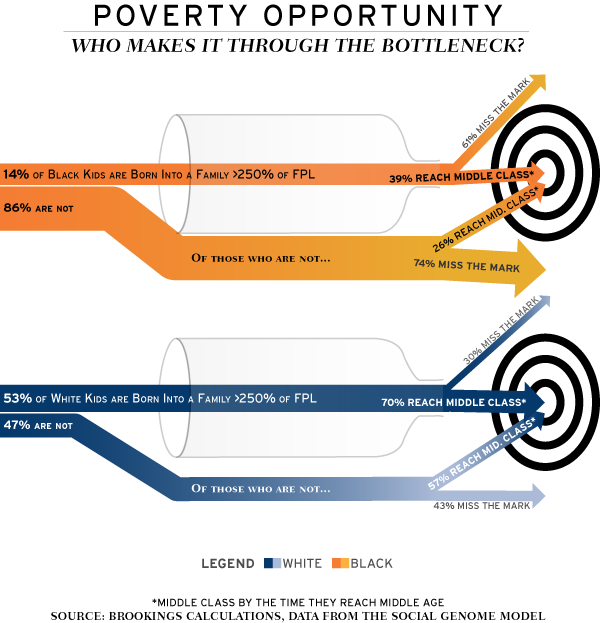Note: Part of a two-week series devoted to exploring what we can learn about social mobility from Joseph Fishkin’s new book, Bottlenecks.
Bottlenecks are narrow points in the opportunity structure where the range of future paths a person can pursue becomes restricted. In prior blogs, we have shown how developmental and qualification bottlenecks shape opportunity in the United States. Here, we discuss the third and perhaps most challenging of Fishkin’s bottlenecks: instrumental-good bottlenecks.
Instrumental-Good Bottlenecks
Instrumental-good bottlenecks arise when:
“Some particular good is needed to ‘buy’ or achieve many other valued goods, or to proceed along many paths that lead to forms of human flourishing.” (Fishkin, Bottlenecks, p. 158)
The paradigm example, of course, is money. People may vary substantially in their plans and preferences, but we all need at least some income to pursue our goals. As a result, money makes the opportunity structure more unitary, since pluralistic preferences become beholden to a single instrumental commodity.
Bottlenecks at birth
The money bottleneck is arguably the most damaging in terms of the way it predicts developmental and qualification bottlenecks: it is, in this sense, a bottleneck to a bottleneck. Access to key developmental opportunities– quality preschool, safe neighborhoods, diverse extracurricular activities, and elite post-secondary educational institutions – requires money and often lots of it. Money bottlenecks in early childhood cast a long shadow over a child’s life. White and black children are between 20 and 50 percent more likely to achieve middle class by middle age if they are born above 250 percent of the poverty line:

So: money matters for opportunity. But the fact that black-white gaps persist even for those who make it through the money bottleneck also demonstrates that money isn’t everything. Rather, it is the interaction between instrumental-good bottlenecks and other critical developmental and qualification bottlenecks that drives these significant racial gaps in adult success.
Reducing the impact of money bottlenecks
Money bottlenecks are the inevitable product of a free-market economy, but are also a political choice. Three policy approaches could loosen the grip of money on opportunity:
- Make money matter less. Some basic goods – such as health or food – are prerequisites to human flourishing. Policies such as the Affordable Care Act, food stamps, and Medicaid help loosen money bottlenecks by ensuring that money is not essential to satisfying these primary needs. Wage insurance could dampen downward shocks to income.
- Target developmental and qualification bottlenecks. Pluralizing the opportunity structure will weaken the link between income and success. Expanding access to developmental opportunities leads to skills-building, which leads to higher pay in the labor market.
- Redistribute income. The US tax-and-transfer system already narrows the gap between rich and poor. (One of Thomas Piketty’s less-famous findings). A political choice could be made to redistribute more aggressively. Right now, whether even the existing level of redistribution can be sustained is an open political question.
Tomorrow: Professor Miles Corak responds.



Commentary
The Money Bottleneck in the American Opportunity Structure
May 13, 2014